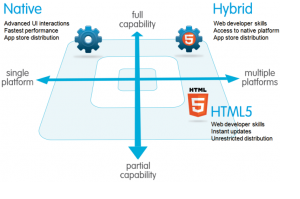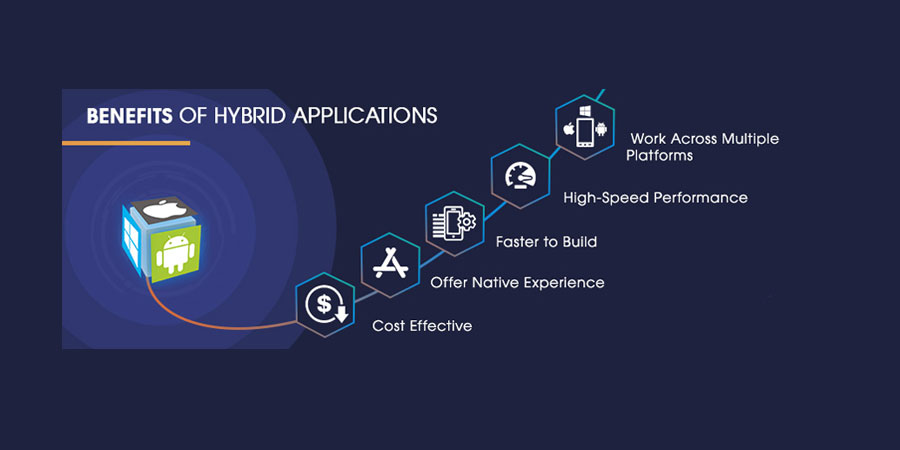AngularJS is a framework used to develop dynamic web applications. It streamlines the process of application development by presenting a higher level of abstraction to...
Benefits of Hybrid mobile apps to customers
A hybrid application is a cross-platform and solves some problems that some may experience with full web applications. There are various benefits that hybrid mobile applications could give to customers.
When it comes to mobile applications, there is no one-size-fits-all approach. When developing an application for customers, there are three choices, namely: developing a native mobile app that integrates with one of the major mobile operating systems, develop an app that mimics an application or develop a hybrid mobile application, that’s somewhere between the latter of the two.
HYBRID MOBILE APPLICATION FOR BUSINESS VIEWPOINT
From a business point of view, one of the reasons to take into consideration a hybrid mobile app is that one need not have to develop a full application for every mobile platform. A hybrid application is cross-platform through design and resolves several concerns, which some would experience with full web applications.
FIVE WAYS THAT HYBRID APPLICATIONS BENEFIT CUSTOMERS
1. USER EXPERIENCE (UX)
When using various browsers on different computers, a website could look thoroughly different on every one. It is the same with the mobile web and that is not good for UX or branding. In contrast, building a hybrid application means customers experience the capabilities of individual mobile device while using an application that is basically standard. If the application has to be updated, one update would fix the application on all platforms, again enhancing the UX for customers. When customers change from mobile platform to platform, still they could enjoy a consistent user experience.
2. SPEED
No one could argue that a hybrid application is quicker compared to a native application, but it is way quicker compared to a mobile application. Unless the application needs huge graphics, it would be fast and not like mobile web applications, it will not need network communication that could be another cause of slowdown.
3. INTEGRATION
Like native mobile applications, hybrid mobile apps use mobile device’s own programming for keeping it in sync with other mobile applications, through a wrapper or overlay. This means that it would work well with cameras, GPSs, messaging and other device information to offer better customer service.
4. OFFLINE USE
Such native applications, hybrid mobile applications use the API devices to store some data offline. This is a huge advantage for customers watching data costs or have poor connectivity.
5. AVAILABILITY
While some say that mobile users have difficulty downloading and installing applications, the download figures do not support the views. According to collected data, anywhere between 56 and 82 million applications would be downloaded in 2013. This does not mean that all users will go on using the applications, but doesn’t mean that customers would expect to find the application there. To get to an application store, one generally needs a native or a hybrid application.
The five features would make a great difference to customers. Moreover, it could also help in knowing that recent research estimates that hybrid applications would represent more than half of all mobile application this year.

NATIVE OR HYBRID MOBILE APPLICATIONS
Creating native apps means the use of native language of the platform, Objective-C on Java on Android and iOS. The main benefit of native apps is the performance. Native applications are compiled to a machine code, which provides the best performance one could get from the mobile device. Best performance includes fluid and rapid animations and full access to phone hardware as well, multi touch support and latest APIs.
Hybrid applications are web apps in the native browser, like UIWebView in iOS as well as WebView in Android. Hybrid apps are developed with CSS, HTML and JavaScript, then wrapped in a native apps with platforms such as Cordova. This enables using any web-native framework one want, and there are many of these.
HYBRID APPS REDUCE DEVELOPMENT COSTS AND TIME TO MARKET FOR A BUSINESS
Customer experience could be the most integral factor, yet it’s not the only one when it comes to making a decision on the right approach. Hybrid apps do:
A. Reduce development costs. One only has to pay to develop and maintain a source code only once. This also reduces testing costs, bug fixes and others.
B. Faster development cycle and time to market. Building code for two platforms at one time means quicker development compared to creating two native applications, and getting a hybrid app to market sooner.
C. Immediate upgrades. Hybrid applications use web a pages for UI elements, so changes to pages are updated in real time. Changes to the application User Interface or other application functions still have to be normally coded and released.
As businesses allow more and more types of mobile devices into the work place, the way they develop applications to accommodate the influx may need to change. Hybrid applications enable organizations to build apps for different operating systems as well as more deftly use the various capabilities of every platform.
Definitely, hybrid apps are becoming the trend. Of course, what path a business chooses depend on its specific needs and how it wants to deliver the best service to customers.
 Feb 6, 2017
Feb 6, 2017 



Comments
Leave a message...